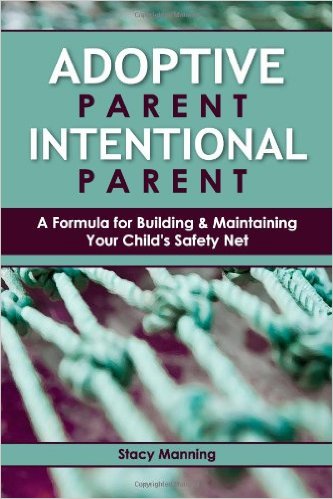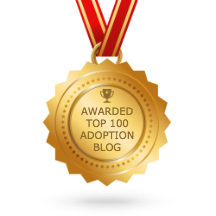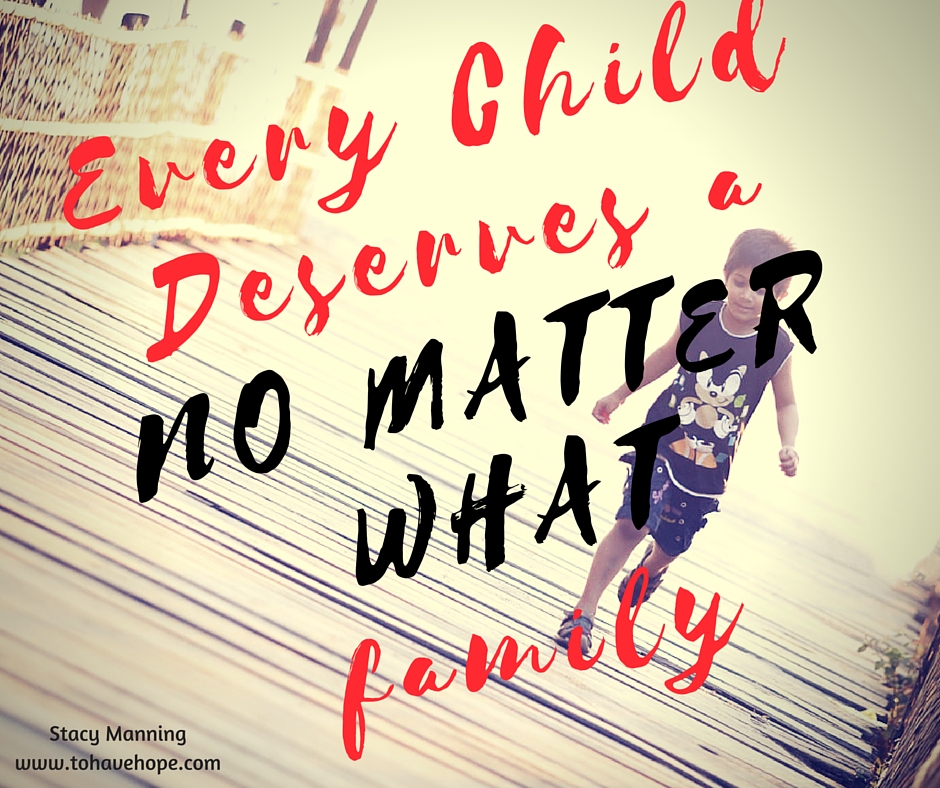|
I Was Thinking...
Intentional Parent: Zeroing in On Emotional Age In an effort to help our children heal, it is important that we become Intentional Parents. Our children suffer from a breach in attachment, grief and the impacts of trauma leaving them with deficits that sabotage relationships, learning and the acquisition of self-worth among other things. As adoptive parents, it is key that we always strive to parent our children based in the knowledge and understanding of these deficits. Many of these deficits are invisible, which creates a challenge for many parents. One of the key issues for us to understand is that our children missed crucial developmental stages from infancy and on up. It is easy to miss these interruptions in development because our children are survivors, they have adapted language and behaviors that help them get by. Most of the time that is exactly what they do…just get by! Early developmental stages are the foundation of social and emotional learning and they contribute to our children’s ability to self- regulate and learn. Later development is directly affected by early developmental experiences. Typical development takes place over time and is affected by social and relational experiences. It naturally has a back and forth motion and becomes more complex. We see our adopted kids often have a lack of self-regulation and many times we get upset about the “two steps forward one step back” movement, often labeling it defiance or not trying. It is not defiance; it is deficit! Typically, their emotional development does not match their chronological age and if they can catch up, it takes a long time and it will be affected by many variables such as anxiety, consistency, the natural ebb and flow of development, and a hyper alert limbic system, etc.. A great tool to use to help your child move through some of those developmental stages is to use their emotional age as your parenting guide. As Intentional Parents, we must strive to meet our children where they are in all aspects of life. Often times this is at a different level and for a longer period of time than their biological counter parts. It is often counter intuitive and different than societies standards to parent your child by their emotional age however when we do, our children are much more successful. What is Emotional Age? The age at which our children are emotionally able to function in the world, in relationships and in daily stressors. It is usually a range more than a single digit. (i.e. 2-3years old) Age range is usually lower at home than in public Typically related to when your child’s trauma or abandonment occurred Marked by missed developmental milestones Where we need to parent our child It would not be uncommon to see an eight year old child who was adopted six years ago have an emotional age range of two to four years of age or a twelve year old child adopted at age eighteen months have an emotional age range of six to eight years old. Remember, living in trauma (experiencing or observing actual or threatened death, physical injury or threat to physical integrity that results in feelings of terror, horror or hopelessness along with traumatic experiences that occur within the care-giving system which include prenatal exposure to alcohol and drugs, neglect, institutionalization, breach in attachment, abuse, abandonment, multiple moves, pain illness and hospitalization) creates unsafe unpredictable environments which are not conducive to the acquirement of normal developmental milestones. Once you feel you have decided upon your child’s emotional age, use it as a marker to make parenting choices that will help to create a healing environment so that your child the can feel safe so his limbic system can learn to calm, he can get his needs met appropriately, successfully manage relationships and expectations, learn tools to work around his deficits, give him time to catch up on learning and really internalize that he is valued for who he is and what he can do right now. So, meet your child at his emotional age. Let him grow up as your child from zero. Let him be your baby (emotionally) if that is what he needs! As you make decisions about how to care for your child and what he needs, use that emotional age. For example, if you are debating whether your child should go outside to play by himself…ask yourself would you let a child their emotional age do that. If your answer is no. then don’t set your child up to fail by putting him in that situation. When put in a situation he is too young for, he will probably do something that will cause upset in your relationship and what he needs more than anything is to have a consistently calm relationship with you, one in which he ultimately feels safer than he ever has before. Healing comes from that kind of safety! Be an Intentional Parent!
0 Comments
I Was Thinking…
The other day I was talking to a mom about the importance of staying emotionally connected to her hurt child - NO MATTER WHAT! Her first response was...easier said than done. SO true, SO true! It is SO important that we are physically and emotionally present for our children as much as possible. Our presence this way is what builds true trust, decreases anxiety, builds self esteem and helps us to meet our children where they are both physically and emotionally, which ultimately creates HEALING! PHYSICAL PRESENCE Our kids really need our PHYSICAL PRESENCE to help them feel SAFE. Our kids need this MORE INTENSELY and even LONGER than their chronological counterparts! Our physical presence is really key to the success of building the all important Safety Net! Our physical presence equals food, safety, warmth, shelter, and believing you will never being abandoned! Physically present means being there physically for your child. Being within eyesight. Being close enough to touch. Being the one who makes the food. Being the one who physically keeps me safe from harm. Being the one who makes sure I am warm by putting a blanket on me. Being there when I am sad or scared. Being all of these things until I believe it will never end! EMOTIONAL PRESENCE Physical Presence is NOT enough! We must fight to be (and stay) EMOTIONALLY PRESENT for our kids as well! This is really where INTENTIONAL PARENTING comes in. Being emotionally present is what maintains the knots of the Safety Net...it is how our children not only feel safe, but feel safe enough and important enough to go out into the world and make an impact! Emotionally present means being connected to your child emotionally. Connected enough to know when I need you without me asking. Connected enough for me to "know" I don't have to be a survivor any more. Connected enough to know my favorites. Connected enough to see pain when I am angry. Connected enough to not quit on me or let me quit on myself. Connected enough that my yuck won't make you go away. So, here's where that "easier said than done" part comes into play. Our children don't necessarily feel safer with us close or really believe that we can be connected enough to know what they feel or need. It takes a long time to earn that trust. In fact, many of our kids test our intentions and fortitude when it comes to being physically and emotionally present for them. It is by staying in it both physically and emotionally, NO MATTER how long, how ugly (as long as you can keep both your child and you safe) and what Push Back Behaviors are at play that we can build that Safety Net our children need to truly heal! I Was Thinking…
Since we adopted, Mother’s Day has been a mixture of pain and pride, love and loss, and confusion and finally, clarity. It is important to me to speak the reality of this holiday for those of us trying to parent and love hurt kids, kids who lost their mom, kids who feel let down by their mom. Mother’s Day really takes on a new meaning and many times not a pleasant one. The world says Mother’s Day should be all flowers and fru-fru with everyone sharing their gratitude and love for this special person. The world doesn’t have a clue about what most of US experience on Mother’s Day! They don’t have a clue about the confusion and pain that OUR KIDS experience on Mother’s Day! It is many times a hard day for children and moms alike! In my quest to be a more Intentional Parent, I have really focused on “hearing” the experiences and feelings of adopted adults. These words have been invaluable to me as an Intentional adoptive mom! I really want to share them with you, especially as we are nearing this holiday. Many adopted adults speak to the fact that Mother’s Day and their birthday were two of the hardest days of the year for them. The general feelings were that while they loved their adoptive mom, the PAIN and CONFUSION over the loss of their birth mom was very intense on Mother’s Day and it “got in the way”, so to speak, of their ability to be able to “do” Mother’s Day! This information speaks so clearly to us - we need to listen and as Intentional Parents we have to take this information and not just KNOW it, but…LIVE it! I have learned over the years that the definition of Mother’s Day is all wrong. I got caught up in feeling like a GOOD MOM if I was treated like a GOOD MOM on a special day with special events and special food and all that stuff. The reality is that I AM a good mom with or without a day that says so! I am a good mom whether or not my child can say so or behave like she thinks it. When my belief in myself changed, my focus was able to change. My focus widened. Being an Intentional Mom meant that I chose to continue to meet each of my children where they were - especially emotionally – especially on Mother’s Day! As my focus widened, Mother’s Day became about all of us, not just me. I was able to see everyone’s perspective. I realized that I can’t imagine the pain and confusion my children must feel. The questioning about their own worth. The confusion of what loyalty is and whether they have to choose only one mom to be loyal to. The pure, unaltered sadness that must be triggered by this day. Mother’s Day has changed for me. In my own brokenness, I used to think that if only my children could just behave better, the day I “deserved” would be perfect. In all honesty, it wasn’t theirs to change; it was mine. I redefined mother for myself. I am now an Intentional Mom. I believe that this is the true definition of Mom…one who clearly sees how others need to be loved and then loves that way, no matter what! Our kids need to be loved the way THEY need to be loved. Typically, that means meeting them where they are when they are there. In the case of Mother’s Day, it means putting it all into perspective. Taking all that we know and LIVING IT! It means that we choose to look at what is ours: our expectations, our beliefs, our short-comings, our fears, our grudges, our pain and then choose to wrap them up in a pretty little package and move them aside – ultimately widening our focus. This is our gift to ourselves! This is our gift to our children! Mother’s Day IS a day to celebrate mothers - there is no doubt that we all deserve it. I say we should all celebrate and be celebrated! As we do that though, let’s be intentional in our expectations, intentional about what defines us as a good mom, and intentional about widening our focus! Celebrate, especially within yourself. You are doing something so important - you are healing a person’s soul! YOU are a great MOM! Happy Mother’s Day! With Love and Gratitude for what you do….remember you are NOT alone! |
Categories
All
Archives
February 2020
|






 RSS Feed
RSS Feed